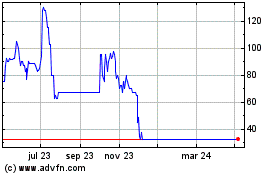TIDMTNT
Tintra PLC
28 June 2022
28 June 2022
TINTRA PLC
("Tintra", the "Group" or the "Company")
Recent Press Articles
"AI in banking needs to be 'explainable'"
Richard Shearer, Group CEO, recently authored an article on "AI
in banking needs to be 'explainable'", which was published in
Finance Derivative is a global finance and business analysis
magazine, published by FM. Publishing, Netherlands. The article can
be viewed online at:
https://www.financederivative.com/ai-in-banking-needs-to-be-explainable/
A full copy of the text can also be found below.
For further information, contact:
Tintra PLC
(Communications Head)
Hannah Haffield
h.haffield@tintra.com
Website www.tintra.com 020 3795 0421
Allenby Capital Limited
(Nomad, Financial Adviser & Broker)
John Depasquale / Nick Harriss / Vivek
Bhardwaj 020 3328 5656
Tintra - Comment Piece
AI in banking needs to be 'explainable'
In the world of banking, AI is capable of making decisions free
from the errors and prejudices of human workers - but we need to be
able to understand and trust those decisions.
This growing recognition of the importance of 'Explainable AI'
(XAI) isn't unique to the world of banking, but a principle that
animates discussion of AI as a whole.
IT and communications network firm Cisco has recently
articulated a need for "ethical, responsible, and explainable AI"
to avoid a future built on un-inclusive and flawed insights.
It's easy to envisage this kind of future unfolding, given that
- in early February - it was revealed that Google's DeepMind AI is
now capable of writing computer programs at a competitive level -
and if we can't spot flaws and errors at this stage, a snowball
effect of automated, sophisticated, but misguided AI could start to
dictate all manner of decisions with worrying consequences.
In some industries, these consequences could be life-or-death.
Algorithmic interventions in healthcare, for example, or the
AI-based decisions made by driverless cars need to be completely
trustworthy - which means we need to be able to understand how such
AI arrive at their decisions.
Though banking-related AI may not capture the imagination as
vividly as a driverless car turned rogue by its own artificial
intelligence, the consequences of opaque, black box approaches are
no less concerning - especially in the world of AML, in which
biased and faulty decision-making could easily go unnoticed, given
the prejudices which already govern that practice.
As such, when AI is used to make finance and banking-related
decisions that can have ramifications for individuals,
organisations, or even entire markets, its processes need to be
transparent.
Explaining 'explainable' AI
To understand the significance of XAI, it's important to define
our terms.
According to IBM, XAI is "a set of processes and methods that
allows human users to comprehend and trust the results and output
created by machine learning algorithms."
These methods are increasingly necessary due to the
ever-increasing advancement of AI capabilities.
To those outside the sphere of this technology, it might be
assumed that the data scientists and engineers who design and
create these algorithms should be able to understand how their AI
makes its decisions, but this isn't necessarily the case.
After all, AI is - as a rule - employed to perform and exhibit
complex behaviours and operations, and outperforming humans is
therefore a sought-after goal, on the one hand, and an insidious
risk on the other - hence the need for interpretable, explainable
AI.
There are many business cases to be made for the development of
XAI, with the Royal Society pointing out that interpretability in
AI systems ensures that regulatory standards are being maintained,
system vulnerabilities are assessed, and policy requirements are
met.
However, the more urgent thread running throughout discussions
of XAI is the ethical dimension of understanding AI decisions.
The Royal Society points out that achieving interpretability
safeguards systems against bias; PwC names "ethics" as a key
advantage of XAI; and Cisco points to the need for ethical and
responsible AI in order to address the "inherent biases" that can -
if left unchecked - inform insights that we might be tempted to act
upon uncritically.
This risk is especially urgent in the world of banking and, for
AML, in particular.
Bias - eliminated or enhanced?
Western AML processes still involve a great deal of human
involvement - and, crucially, human decision making.
This leaves the field vulnerable to a range of prejudices and
biases against people and organisations based in emerging
markets.
On the face of it, these biases would appear to be rooted in
risk-averse behaviours and calculations - but, in practice, the
result is an unsophisticated and sweeping set of punitive hurdles
that unfairly inconvenience entire emerging regions.
Obviously, this set of circumstances seems to be begging for
AI-based interventions in which prejudiced and flawed human workers
are replaced with the speed, efficiency, and neutral coolness of
calculation that we tend to associate with artificial
intelligence.
However, while we believe this is absolutely the future of AML
processes, it's equally clear that AI isn't intrinsically less
biased than a human - and, if we ask an algorithm to engage with
formidable amounts of data and forge subtle connections to
determine the AML risk of a given actor or transaction, we need to
be able to trust and verify its decisions.
That, in a nutshell, is why explainable AI is so necessary in
AML: we need to ensure that AI resolves, rather than repeats, the
issues that currently characterise KYC/AML practices.
There are different ways this can be achieved. The Royal Society
proposes two categories: either the development of "AI methods that
are inherently interpretable" or, alternatively, "the use of a
second approach that examines how the first 'black box' system
works."
Transparency and trust
The specific method used to achieve explainable AI in AML isn't
as important as the drive to ensure that we don't place all our
eggs in a potentially inscrutable basket: any AI we use to
eliminate prejudice needs to have trust, confidence, and
transparency placed at the heart of its calculations.
If we don't put these qualities first, the 'black box' of
incomprehensible algorithms may well continue to put a 'black mark'
by the names of innocent organisations whose only crime is to exist
in what humans and AI falsely perceive to be the 'wrong place.'
ENDS
Richard Shearer, CEO of Tintra PLC
https://www.tintra.com
This information is provided by Reach, the non-regulatory press
release distribution service of RNS, part of the London Stock
Exchange. Terms and conditions relating to the use and distribution
of this information may apply. For further information, please
contact rns@lseg.com or visit www.rns.com.
Reach is a non-regulatory news service. By using this service an
issuer is confirming that the information contained within this
announcement is of a non-regulatory nature. Reach announcements are
identified with an orange label and the word "Reach" in the source
column of the News Explorer pages of London Stock Exchange's
website so that they are distinguished from the RNS UK regulatory
service. Other vendors subscribing for Reach press releases may use
a different method to distinguish Reach announcements from UK
regulatory news.
RNS may use your IP address to confirm compliance with the terms
and conditions, to analyse how you engage with the information
contained in this communication, and to share such analysis on an
anonymised basis with others as part of our commercial services.
For further information about how RNS and the London Stock Exchange
use the personal data you provide us, please see our Privacy
Policy.
END
NRAEADKXASPAEFA
(END) Dow Jones Newswires
June 28, 2022 02:00 ET (06:00 GMT)
Tintra (LSE:TNT)
Gráfica de Acción Histórica
De Mar 2024 a Abr 2024

Tintra (LSE:TNT)
Gráfica de Acción Histórica
De Abr 2023 a Abr 2024
